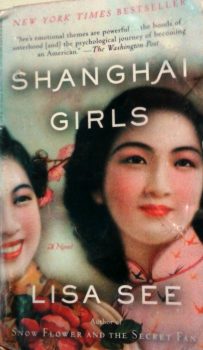Book Review: Shanghai Girls / Lisa See Posted by Ayana on Apr 3, 2017 in Culture
Shanghai Girls is a 2009 novel by Lisa See. As the title suggests, the book is composed of two protagonists: a girl named Pearl and the city Shanghai. The narrator of the book is Pearl, and while she is telling the story of her and of her sister, Shanghai embodies the story of all China. Misfortune hits Pearl at the age of 21, when Shanghai is attacked by Japan in 1937. The turbulent events of Pearl’s life are interwoven with the Chinese nation during the years preceding World War II. Shanghai Girls provides a glance into Pearl’s life, and more fascinating – a glance into the Chinese culture and history. Let’s read into the book and learn some new words on the way.
上海Shànghǎi
Shanghai, the “Paris of Asia”, has a figurative name. It consists of two characters: 上shàng meaning “above”, and 海hǎi meaning “sea”. Together they compose the phrase ‛upon the sea’. The city upon the sea was an interesting place to live in at the beginning of the 20th century. International attention to上海 grew in the 19th century due to European recognition of its economic and trade potential on the Yangtze river. Wars and treaties gave in上海 to foreign trade, and citizens of many countries came to上海to live and work.
月份牌 Yuèfènpái
Pearl is only 21 years old. Her sister May is 3 years younger. The beautiful juvenile sisters enjoy the good life of 上海: they shop, they dance, they hang out with friends, and they work as models of月份牌. 月份牌is an art genre that was prevalent in Shanghai during the early 20th century, and was very popular among the locals. 月份牌are painted calendar posters that were influenced by Western advertisements. Pearl and May posed for hours, while the artist painted their beautiful figures and faces for calendar posters that advertise cigarettes, batteries and other goods.
子孙桶Zǐsūn tǒng
Pearl’s mom (妈妈māmā) has bound feet that restrict her walking. They had been bound to find her a wealthy match. But it’s 1937 now, and unlike their 妈妈, Pearl and May’s feet aren’t bound. Moreover, the girls dare to dream about love and marriage. Pearl fantasizes about wedding with the artist she works for. In her imagination it’s a big party, including all the Chinese customs. 子孙桶, for example, literally means ‛buckets of off-springs’. It’s a three-part dowry: a bucket, a basin to wash one’s feet and a small barrel as toilet. In the past, it wasn’t only useful for daily use, but also a way to bless the new couple with future generations. When delivered, it was usually filled with dates, eggs, fruits etc, to wish the couple fortune, longevity, and lots of boys and grandsons. Hence the name: 子zǐ means son; 孙sūn means grandson; 桶tǒng means bucket. Nowadays more and more Chinese houses have inside toilets and showers so子孙桶 is less needed, but still acceptable as decoration and blessing. You can buy it online, with prices ranging from 40 Yuan to 1600 Yuan: http://www.crmrj.net/crmrtedentn/
债务Zhàiwù
Pearl’s dream is shattered to pieces when her father loses everything they possess in gambling. To pay his 债务 (debt) he had to give his daughters as wives to two Chinese-American brothers (兄弟Xiōngdì). The wedding ceremony is short and simple: signing papers at the courthouse, followed by dinner. There’s no子孙桶 and no joy. The 兄弟 and their new wives are due to return to America (美国Měiguó) in couple of weeks, but Pearl decides not to show up on board. A month after, she is terrified to realize that the Green Gang – a Chinese criminal organization, active in 上海 during the early to mid 20th century – is involved. The Green Gang was hired to make sure Pearl’s father will pay his 债务 as agreed.
姐姐Jiějiě
According to the Five Cardinal Relations of Confucius (孔子Kǒngzǐ), the younger sister妹妹 (mèimei) has to obey the older sister 姐姐 (jiějiě), while the older sister has to take care of the younger sister. And so Pearl does, from the beginning of the novel till the end. Pearl always bears May in her thoughts, always looks after her: when they got wounded from the bombings during the Battle of Shanghai; when they run away from 上海; fleeing from the Green Gang and the Second Sino-Japanese war (1937-1945).
美国Měiguó
After surviving their perilous journey from 上海, the girls finally obtain tickets to美国. At November (十一月shíyī yuè) the girls arrived to San Francisco bay, and led to Angel Island Immigration Station. There they are waiting to enter the Flower Flag Country (花旗国Huāqí guó) – a Chinese epithet to America that was common in the 19th and early 20th centuries. Another nickname the Chinese gave to America, which appears in the book a lot, is Gold Mountain (金山Jīnshān). This name is more specific, indicating western North America, due to the gold found there.
If you think Pearl and May found peace in San Francisco, you should think again. Their struggles continue through life in America. But I will let you read their intriguing story in 美国on your own. Enjoy!
Text vocabulary
上海Shànghǎi = Shanghai
月份牌 Yuèfènpái = painted calendar posters
子孙桶Zǐsūn tǒng = a traditional dowry
妈妈Māmā = mother, mom
债务Zhàiwù = debt
兄弟Xiōngdì = brothers
美国Měiguó = America
孔子Kǒngzǐ = Confucius
姐姐Jiějiě = old sister
妹妹Mèimei = young sister
十一月Shíyī yuè = November
花旗国Huāqí guó = the flower flag country
金山Jīnshān = Gold Mountain

Build vocabulary, practice pronunciation, and more with Transparent Language Online. Available anytime, anywhere, on any device.






Leave a comment: